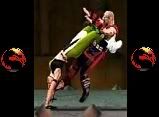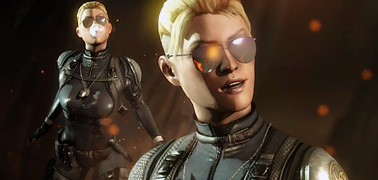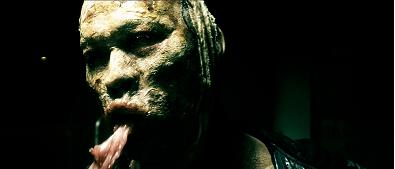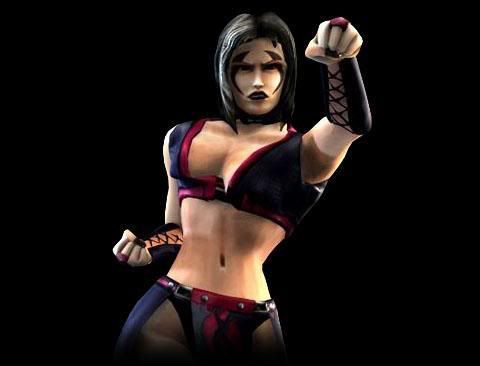February 24, 2011 -- IGN are currently reporting that Mortal Kombat will be refused classification in Australia. Their source, who wishes to remain anonymous, claims to have received an e-mail detailing the necessary return of pre-order funds and removal of all promotional materials from retailers, who have been promoting the game normally up to this point. The game had been expected to receive a simultaneous release with the United States, available locally April 20.
IGN are also reporting an official statement from current MK license holders and distributors, Warner Brothers Interactive Entertainment:
The highly anticipated video game Mortal Kombat, published by Warner Bros. Interactive Entertainment (WBIE) in Australia, has been refused classification by the Australian Classification Board and will not release in Australia. We are extremely disappointed that Mortal Kombat, one of the world's oldest and most successful video games franchises, will not be available to mature Australian gamers.
WBIE would not market mature content where it is not appropriate for the audience. We understand that not all content is for every audience, but there is an audience for mature gaming content and it would make more sense to have the R18+ classification in Australia. As a member of the iGEA, WBIE is reviewing all options available at this time.
This refusal of classification is something Australian gamers have had to be aware of since the announcement that Mortal Kombat would return the series to it's graphic origins. This disappointing confirmation comes despite the fact a Mortal Kombat game has never gone unreleased in the country before, where MK has long been a popular and well selling franchise.
Mortal Kombat is, of course, no stranger to classification controversy.
The series' first installments are frequently cited as one of the key contributors to the formation of the Entertainment Software Ratings Board (ESRB) in the United States. Formed in 1993 amidst congressional hearings regarding violence in video games, the ESRB helped to appropriately inform parents and consumers about video game content.
The controversy over Australia's lack of an adult rating for video games has been well publicized in recent years. The Australian Classification Board (ACB) has come under attack from a wide variety of sources, in and out of the country, garnering widespread support from public petitions, as well as major industry figures. EA President, Frank Gibeau, criticized the basic rights infringed by the classification in a release to media outlets in 2010:
"As the Australian government moves to participate in the economy of the global gaming market, policy makers should consider the environment they create for game makers. Governments that design policies hostile to game developers and their creative medium will struggle to attract investment from the global industry. The global gaming industry is robust and growing faster than any other entertainment medium. If Australia seeks to benefit from this tremendous creative and economic opportunity, its policies should reflect an understanding of the marketplace and a willingness to participate."
To date, Australia has equivalent adult ratings for most other major entertainment mediums, making the video game rating system a strange and specific aberration. In the past, classification has also been notably erratic, often seeing some games receive much lower ratings than International counterparts, due to the lack of an adult eighteen and over classification. Contributing causes for this inconsistency is said to vary, including the interests of contemporary governments, as well as the processes employed by the board themselves.
Figurehead of opposition to the adult rating and frequent road block, South Australian Attorney-General, Michael Atkinson; left his position in March of 2010. Despite this, opportunity for change has continued to go unfulfilled. After the release of a December 2009 "Discussion Paper" canvassed public opinion, subsequent review of the classification in December 2010 failed to produce a result, the decision delayed by the Standing Committee of Attorneys General for another year. The 2009 paper returned a 98.4% approval from public submissions, according to Espresso Communications. The site also quotes CEO of the Interactive Gaming & Entertainment Association (iGEA), who said:
"It’s disappointing to hear that an adult rating for video games will be delayed once again despite mass support from the Australian community, whether it is from adult gamers who want the right to play games that appeal to them or parents who want clear guidelines for their children."
While Mortal Kombat has been refused classification at this point, it is not unusual for a review to be submitted. The reported unanimous decision means an appeal cannot be lodged, but Warner Brothers Interactive will almost certainly add their considerable cache to mounting pressure on the ACB. Possibility of an edited release may also lie on the horizon, if an unedited release cannot be negotiated.
Update: Kotaku are reporting on the reasons for refusal of classification, which primarily revolve around Fatalities performed with a realistic graphics engine [document included below]. The list includes spoilers for yet to be revealed moves, including fatalities for Shao Kahn, Stryker and Kitana. The file also lends credence to recent reports that Shao Kahn will appear as a playable character.
- Stryker tasers his opponents and then explicitly shoots their head off with his gun. Blood and gore is noted.
- Shao Khan uses his hands to explicitly rip an opponent’s body vertically in two
- Kitana uses her ‘folding fan’ weapon to explicitly dismember then decapitate her opponent, with copious blood flow noted.
The game includes over 60 fatalities (some of which are noted above) which contain explicit depictions of dismemberment, decapitation, disembowelment and other brutal forms of slaughter. Despite the exaggerated conceptual nature of the fatalities and their context within a fighting game set in a fantasy realm, impact is heightened by the use of graphics which are realistically rendered and very detailed. In the opinion of the Board, the game contains violence that exceeds strong in impact and is unsuitable for a minor to see or play. The game should therefore be Refused Classification pursuant to item 1(d) of the computer games table of the National Classification Board.
Update Mar. 2: IGN are reporting updates on WBIE's intentions to appeal the ban on the adult rated game. In an official statement, Warner have expressed clear goals to avoid releasing censored versions of their game, intent on resubmitting an identical copy for review to the Austrailan Classification Board.
After careful consideration Warner Bros. Interactive Entertainment Australia have decided to appeal to the Australian Classification Review Board against the RC (Refused Classification) decision given to Mortal Kombat. After reviewing both the game play and the Board's original decision WBIE Australia believe the violence in the game is on par with numerous other titles readily available for sale in the Australian market. As such the company wants to exhaust all options to make the game available to Mortal Kombat fans in this country. An identical version of the game will be submitted for appeal.
Australian news outlet, News.com.au, have a full feature on the history of Mortal Kombat in Australia, which includes a similar history to that of the United States and it's formation of the ESRB. Discussed in the article is the symmetry of the MK-inspired March 1, 1995 Commonwealth Classification Act, which planted the seeds for a Refusal of Classification sixteen years later.
The article continues to look at unrest within the Australian gaming community, who project that Mortal Kombat will simultaneously become the most pirated and imported game in the region, should it fail to receive a retail release. The threat renews pubilc pressure on federal governments and difficult state Attorney-Generals who have allowed the problem to persist, despite overwhelming public outcry, and a new survey that reports a speculative 53.45% reduction of employees working in the Australian development industry [since 2007].
Mortal Kombat Online supports the freedoms and adult expectations of the R18+ rating for Australian gamers. We will continue to cover the story as it develops, and encourage users to post their support for change, and disappointment in the refusal, on our forums. If you are motivated to do so, you can contact the Classification Board online via their website. Be encouraged to express yourself clearly and intelligently, if you really want to help.

























